七年级下册(2020年仁爱版)各单元重点知识点汇总
(完整版)仁爱版英语七年级下全部知识点总结.doc

七年级下英语知识点总结Unit 5 Topic1㈠短语总结1.在学校大门口 at the school gate2.来学校come to school3. 去学校go to school4. 上课have class / have classes5. 步行on foot6.骑自行车ride a bike/ ride bikes/ by bike / on a bike7.坐公交by bus / take a bus8.坐地铁by subway / take the subway / on the subway9.坐飞机by plane/ take the plane / on the plane10.坐小汽车by car / in a car/ take a car/ drive a car11. 坐轮船by ship12. 坐小船by boat13. 坐火车by train / on the train14. 在我们组in our group15.一群学生a group of students16.我们中的三个人 three of us17.在平日 on weekdays18.在周末 on the weekends / at weekends19.起床 get up20.睡觉 go to bed21.早起 get up early22.回家 go home23.到家 get home24.去动物园 go to the zoo25.去公园 go to the park26.看电影 see a movie / film27.看电视 watch TV28.在晚上 in the evening / at night29.帮助父母 help parents30.做某人的家庭作业 do one’s ( my/ her/ his/ your/ their)homework31.在学校 at school32.知道 ,了解 know about / learn about33.校园生活 school life34.一个美国学生 an American student35.在美国 in America / in the U.S.A.36.许多学生 many students/ a lot of students/ lots of students37.很少 very few38.吃午饭 have lunch39.出去吃饭 eat out40.在校期 on school days41.休息一会 have a short rest/ break42.午后 after lunch43.在某人的余 in one’s ( my/ his/ her/ their⋯)free/ spare time44.打球 play basketball45.踢足球 play soccer / football46.琴 play the piano47.吉他 play the guitar48.拉二胡 play erhu49.去游泳 go swimming / go for a swim50.去划船 go boating51.球 a ball game / ball games52.一年四次 four times a year53.听音 listen to music54.read books55.看 read newspapers56.看医生 see a doctor57.去 go to the library58.一周两次 twice a week59.朋友 meet friends60.每天 every day61.在七点半 at half past seven62.一小会 for a little while / for a short time63.晚后 after supper64.吃 have dinner65.吃早 have breakfast㈡重要句型1.I usually come to school by subway.同句 : I usually take the subway to school.划部分提 : How do you usually come to school?似的有:go to school by bike=go to schoolon a bike= ride a bike to school=ride to schoolgo home by bus=go home on a bus=take a bus home2.How do you usually/ often⋯?你通常 /常怎⋯?3.It ’stime for class.=It’s time to have class. =It’s time for having class.4.What about you? =How about you?5.How often ⋯? 率,回答可以用率副: always, usually, often,sometimes, seldom, never, every day ,every +其他名或表示率的短回答表示率的短:次数 +位e.g. : once a day / twice a week / three times a month6.The early bird catches the work. ( ) 笨先7.Work / Study must come first. 工作 / 学必放在第一位!8. Classes begin at eight. =Class begins at eight.提问:What time does the class begin? / What time do the classes begin?㈢重要单词的用法1.look (感官动词 ) 看起来,后面加形容词His mother looks very young.They look very cute.Her dress looks very nice.You look very cool in this coat.2. by 介词by 后面直接加表示交通工具的名词,中间不用任何词修饰,如: by bike by +动词 ing 形式,表示通过某种方式People show love to their mothers by giving cards.You can be a good student by working hard.3.over (形容词 ) School/ Class is over.4.begin现在分词 : beginning 过去式 : beganbegin to do sth , begin doing sthHe begins to write a letter. =He begins writing a letter.如果 begin 本身为分词,只能用begin to do sthHe is beginning to run.5.listen to 听(动作), hear 听见 (结果 )6.always 反义词 never7.本话题涉及的时态为一般现在时,句中常有频率副词或表示频率的短语,如果主语为三单,动词一定要用三单!(四)易错题1.You new watch ______ (look) very nice!2.Here ______(be) some news.3.Oh, come on! It’s time_____ going to school.4.They usually go to school on ________(feet).5.In my class, forty of _______(we) go to school by bike.6.The early bird ______ (catch) the worm.7.Kangkang often _____ (ride) a bike to the park.8.What time _____ (be)school over?9.Work must come ______(once).10.It ’stime ____you to get up.11.We often _____ books in the morning.12.Jill ’s friend like ______(study) in our school.13.Mr. Wang teaches ______(we) English. _____ of us like him.14.How about ______(go) out with me?15.Most students go to school _____ the school bus.16._______ do you go shopping with your mother?A. How soonB. How farC. How oftenD. How much17. What time do you usually get up _____ weekdays?18. He ______ busy, so he has no time to play with us.A. is alwaysB. seldom isC. always isD. often is19.The last class______(finish) at twelve o’clock.20.Let’s go______(boat).21.It’stime to have breakfast. 同(义句 )______________________________________________________.22.Michael often rides a bike to school. 同(义句 )______________________________________________________.23.I always go to work on foot. (对划线部分提问 )______________________________________________________.24.My mother goes shopping twice a week. 对(划线部分提问 )______________________________________________________.25.Mary always reads books in the library. 反(义句 )______________________________________________________.26.He usually does his homework at school.否(定句 )______________________________________________________.27.They often go to school by bus in the morning. 对(划线部分提问 ) ______________________________________________________.28.Jane seldom watches TV on weekdays改.(为一般疑问句 )______________________________________________________.29.He usually has lunch at home. 对(划线部分提问 )______________________________________________________.30.Li Ping often goes to work on foot. (同义句 )______________________________________________________.31.几乎没有学生乘地铁去学校。
仁爱版七年级(下册)知识点要点总结

仁爱版七年级(下册)知识点要点总结本学期研究的知识点包括:
语文
- 形音义的关系
- 修辞手法的运用
- 古诗文的鉴赏
- 现代文阅读与写作
数学
- 相反数与绝对值
- 分数加减乘除
- 二次根式与平方根
- 整式的加减乘除
英语
- 现在进行时
- 祈使句
- 简单过去式
- 数词与日期
历史
- 秦汉和尚书制的改革- 西汉时期的政治和军事- 东汉时期的政治和文化- 三国时期的政治和文化
生物
- 细胞的基本结构和功能- 生物多样性的认识
- 植物的结构和生长
- 动物的体内环境和调节
地理
- 中国的地理位置和自然地理条件
- 中国的人口与经济
- 中国的交通和旅游
- 国际热点问题的认知
政治
- 报告的主要内容
- 中国特色社会主义的本质特征
- 社会主义核心价值观的内涵与精神实质
- 当前的国际形势和中国与世界的关系
以上是本学期主要的知识点汇总。
在学习各科知识的同时,要
注意拓展视野、强化思维训练,努力提高语言表达能力、计算能力、探究能力和综合应用能力。
仁爱版七年级下册英语7~8单元知识点总结

仁爱版七年级下册英语7~8单元知识点总结Unit 7 Topic 1重点句型—Were you born inHebei?Yes, I was./ No, I wasn’t.—When was your daughter born?—She was born on October 22nd, 1996.—Whenis your birthday? May 13th—What sthe shape of your present?It’s acircle./ rectangle / triangle/square.—What’sit like ? It’s like a star.—Howlong/wide is it?—Whatdo we use it for?We use it to study English.重点词组及短语talk about 谈论place of birth 出生地date of birth 出生日期after class 下课big fan 狂热粉丝have a birthday party 举行生日聚会have a look 看make a cake 做蛋糕do some cleaning 打扫cook a big dinner 做一顿丰盛的晚餐重点讲解1 英语中日期可以有两种表达法:(1)月日,年。
May 1st,2008(2)日月,年。
1stMay,20082 plan to do sth.计划做某事3 基数词变序数词的规律:基变序,有规律;一、二、三,特殊记;从四起,th; 八去t来九去e; ve要用f替。
整十该y为ie,后面再跟th;几十几和几百几,只变个位就可以。
4 介词in,on, at 在时间前面的应用1)在上下午、傍晚用inin the morningin the afternoonin the evening2)在季节、年、月前用in,inspring/summer/fall/winterin 2002, inJuly, in February, 20013)在具体的某一天及某一天的上下午、晚上用on 。
2020年春仁爱版英语七年级下册词组及重点句型

2020年春仁爱版英语七年级下册词组及重点句型Unit5 Topic 1e/go to school 去上学at the school gate 在校门口2. ride a/the/one’s bike to ……sw by biketake a/the bus to …….. sw by bustake a/the ship to …….. sw by shiptake a/the boat to ……..sw by boat动词take a/the plane to ……..sw go/come to…sw by plane= by air take a/the train to ……..sw by traintake a/the subway to ……..sw by subwaydrive a/the/one’s car to ……..sw by carwalk to ……..sw on foote on 加油,赶快4.get up起床5. on weekdays /on weekends 在工作日/在周末6.do one’s (my/ his /her/our/their….) homework做家庭作业7.watch TV看电视8.in the morning/afternoon/evening在早上/下午/晚上9.play basketball/soccer/ping-pong打篮球/踢足球/打乒乓球10.see a movie看电影11.have breakfast/lunch/dinner 吃早饭/午饭/晚饭12.have four classes上四节课13.after school/class/dinner 放学后/下课后/晚饭后14. get to….到达get home到家15.go to bed 去睡觉16.go shopping/swimming/fishing 去购物/游泳/钓鱼17.listen to music 听音乐18.go to the zoo/library/park 去动物园/图书馆/公园19.meet friends 会见朋友20.read books 读书21.once/ twice a week一周一次/两次22.three times a week 一周三次23.very often很经常24. know about 了解25. the school life校园生活26. in one’s free time 在某人空闲时27. for a short time 一小会儿重点句型1.Happy New Year! 新年快乐!The same to you. 你也一样。
(完整版)仁爱版七年级英语下册知识点总结
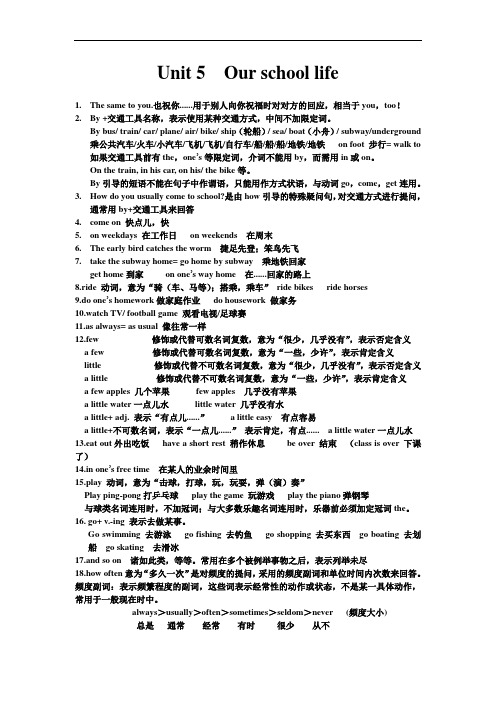
Unit 5 Our school life1.The same to you.也祝你......用于别人向你祝福时对对方的回应,相当于you,too!2.By +交通工具名称,表示使用某种交通方式,中间不加限定词。
By bus/ train/ car/ plane/ air/ bike/ ship(轮船)/ sea/ boat(小舟)/ subway/underground 乘公共汽车/火车/小汽车/飞机/飞机/自行车/船/船/船/地铁/地铁on foot 步行= walk to 如果交通工具前有the,one’s等限定词,介词不能用by,而需用in或on。
On the train, in his car, on his/ the bike等。
By引导的短语不能在句子中作谓语,只能用作方式状语,与动词go,come,get连用。
3.How do you usually come to school?是由how引导的特殊疑问句,对交通方式进行提问,通常用by+交通工具来回答e on 快点儿,快5.on weekdays 在工作日on weekends 在周末6.The early bird catches the worm 捷足先登;笨鸟先飞7.take the subway home= go home by subway 乘地铁回家get home到家on one’s way home 在......回家的路上8.ride 动词,意为“骑(车、马等);搭乘,乘车”ride bikes ride horses9.do one’s homework做家庭作业do housework 做家务10.watch TV/ football game 观看电视/足球赛11.as always= as usual 像往常一样12.few 修饰或代替可数名词复数,意为“很少,几乎没有”,表示否定含义a few 修饰或代替可数名词复数,意为“一些,少许”,表示肯定含义little 修饰或代替不可数名词复数,意为“很少,几乎没有”,表示否定含义a little 修饰或代替不可数名词复数,意为“一些,少许”,表示肯定含义a few apples 几个苹果few apples 几乎没有苹果a little water一点儿水little water 几乎没有水a little+ adj. 表示“有点儿......” a little easy 有点容易a little+不可数名词,表示“一点儿......”表示肯定,有点...... a little water一点儿水13.eat out外出吃饭have a short rest 稍作休息be over 结束(class is over 下课了)14.in one’s free time 在某人的业余时间里15.play 动词,意为“击球,打球,玩,玩耍,弹(演)奏”Play ping-pong打乒乓球play the game 玩游戏play the piano弹钢琴与球类名词连用时,不加冠词;与大多数乐趣名词连用时,乐器前必须加定冠词the。
仁爱英语七年级下册unit8知识点
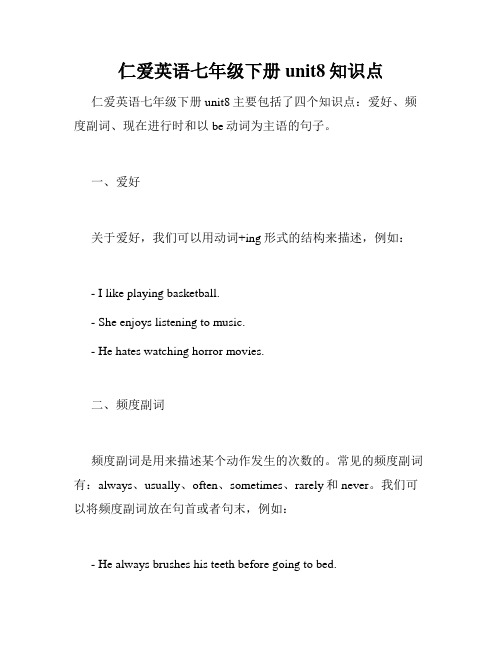
仁爱英语七年级下册unit8知识点仁爱英语七年级下册unit8主要包括了四个知识点:爱好、频度副词、现在进行时和以be动词为主语的句子。
一、爱好关于爱好,我们可以用动词+ing形式的结构来描述,例如:- I like playing basketball.- She enjoys listening to music.- He hates watching horror movies.二、频度副词频度副词是用来描述某个动作发生的次数的。
常见的频度副词有:always、usually、often、sometimes、rarely和never。
我们可以将频度副词放在句首或者句末,例如:- He always brushes his teeth before going to bed.- I usually eat breakfast at 7 o'clock in the morning.- They sometimes go to the park on weekends.- She rarely drinks coffee because it makes her nervous.- We never miss our English class.三、现在进行时现在进行时用来描述正在进行的动作,其结构为:be动词+现在分词。
例如:- He is playing basketball with his friends now.- They are watching TV in the living room.- She is studying English at the library.- We are listening to music in the classroom.需要注意的是,某些动词不宜用于现在进行时,例如感官动词(see、hear、smell、notice、feel、taste)和状态动词(be、seem、appear、look、feel、sound、taste)。
七年级下册英语仁爱版知识点总结
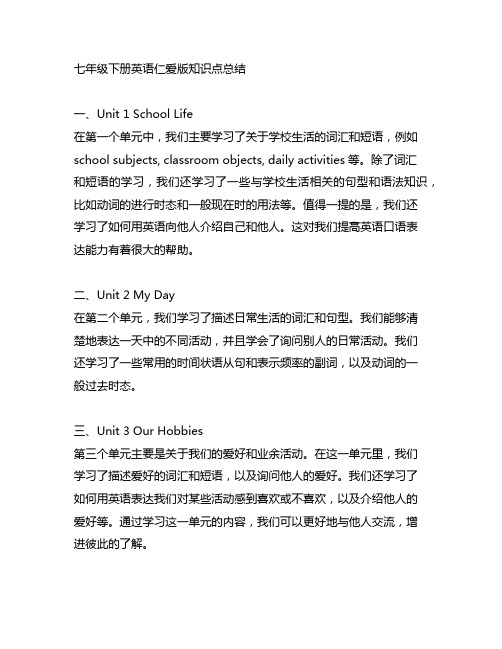
七年级下册英语仁爱版知识点总结一、Unit 1 School Life在第一个单元中,我们主要学习了关于学校生活的词汇和短语,例如school subjects, classroom objects, daily activities等。
除了词汇和短语的学习,我们还学习了一些与学校生活相关的句型和语法知识,比如动词的进行时态和一般现在时的用法等。
值得一提的是,我们还学习了如何用英语向他人介绍自己和他人。
这对我们提高英语口语表达能力有着很大的帮助。
二、Unit 2 My Day在第二个单元,我们学习了描述日常生活的词汇和句型。
我们能够清楚地表达一天中的不同活动,并且学会了询问别人的日常活动。
我们还学习了一些常用的时间状语从句和表示频率的副词,以及动词的一般过去时态。
三、Unit 3 Our Hobbies第三个单元主要是关于我们的爱好和业余活动。
在这一单元里,我们学习了描述爱好的词汇和短语,以及询问他人的爱好。
我们还学习了如何用英语表达我们对某些活动感到喜欢或不喜欢,以及介绍他人的爱好等。
通过学习这一单元的内容,我们可以更好地与他人交流,增进彼此的了解。
四、Unit 4 Celebrations第四个单元主要是关于庆祝活动。
我们学习了描述不同庆祝活动的词汇和短语,以及询问别人关于庆祝活动的相关问题。
我们还学习了一些关于时间的表达方式,比如日期、星期、月份等。
我们还学习了一些关于情感的形容词,以及表示祝福的句型和短语。
五、Unit 5 The World Around Us在第五个单元中,我们学习了描述环境和自然现象的词汇和短语,以及相关的句型和语法知识。
我们可以用英语描述不同的自然现象,比如天气、季节等,也能够表达对自然环境的关心和热爱。
除了这些,我们还学习了一些关于地点和方位的词汇,以及表示允许和禁止的句型和短语。
六、Unit 6 Amazing Stories在第六个单元中,我们学习了一些关于神话故事和传奇人物的词汇和短语。
(仁爱版)英语七年级下册知识点归纳与总结
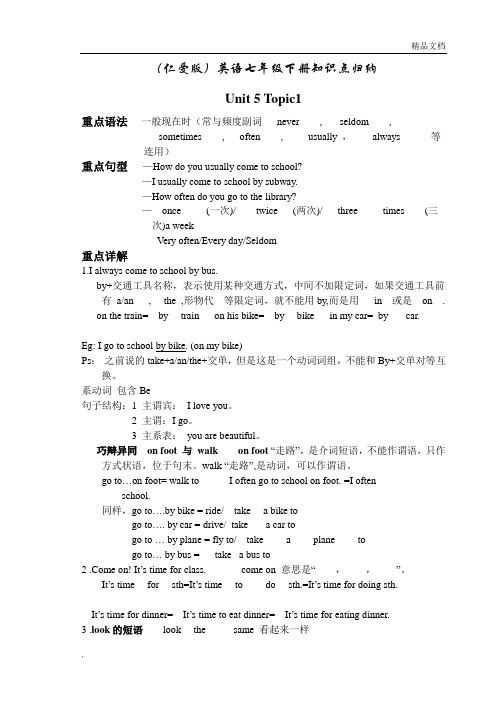
(仁爱版)英语七年级下册知识点归纳Unit 5 Topic1重点语法一般现在时(常与频度副词___never____, ___seldom____,___sometimes____,___often____, ___usually_,____always______等连用)重点句型—How do you usually come to school?—I usually come to school by subway.—How often do you go to the library?—__once_____(一次)/____twice___(两次)/___three ___times____(三次)a weekVery often/Every day/Seldom重点详解1.I always come to school by bus.by+交通工具名称,表示使用某种交通方式,中间不加限定词,如果交通工具前有_a/an___, __the_,形物代_ 等限定词,就不能用by,而是用___in__或是__on__.on the train=__by__ train on his bike=__by__ bike in my car=_by___ car.Eg: I go to school by bike. (on my bike)Ps:之前说的take+a/an/the+交单,但是这是一个动词词组,不能和By+交单对等互换。
系动词包含Be句子结构:1 主谓宾:I love you。
2 主谓:I go。
3 主系表:you are beautiful。
巧辩异同on foot 与walk on foot “走路”,是介词短语,不能作谓语,只作方式状语,位于句末。
walk “走路”,是动词,可以作谓语。
go to…on foot= walk to I often go to school on foot. =I often ________school.同样,go to….by bike = ride/__take__ a bike togo to…. by car = drive/_take___ a car togo to … by plane = fly to/__take__ __a__ __plane__ __to__go to… by bus =___take_ a bus to2 .Come on! It’s time for class. come on 意思是“____,____,____”。
七年级下册英语unit7仁爱版知识点

七年级下册英语unit7仁爱版知识点Unit 7主要介绍了购物和做家务的相关语言知识。
以下是本单元的重点知识:
一、购物语言
1.询问价格和折扣:
- How much is it?(这个多少钱?)
- Is it on sale?(打折吗?)
- What's the discount?(有多少折扣?)
2.询问购物需求:
- Can I help you?(需要帮忙吗?)
- What size/color do you need?(你需要什么尺码/颜色?)
- What do you want to buy?(你想买什么?)
3.支付和找零:
- How do you want to pay?(你想用什么方式支付?)- Here's your change.(这是找给您的钱)
二、家务语言
1. 做家务的动词:
- sweep(扫地)
- mop(拖地)
- vacuum(吸尘)
- wipe(擦拭)
- dust(擦灰尘)
- clean(清洁)
- wash(洗)
- iron(熨烫)
2. 做家务的时间:
- on weekends(在周末)
- in the morning(早上)
- after school/work(放学/下班后)
- before bedtime(睡觉前)
3. 表示强调的副词:
- really(真的)
- very(非常)
- extremely(极其)
以上是本单元的重点知识,掌握上述语言知识可以帮助你更好地与他人交流。
希望你能够认真学习,在日常生活中灵活运用。
七年级英语下册(仁爱版)语言知识点归纳

七年级英语下册(仁爱版)语言知识点归纳Unit 5 Our School Lifetopic1 How do you go to school?一、重点词语:1. wake up 醒来,唤醒 get up 起床2. go to school 去上学 go home 回家3. go dancing / shopping / skating / swimming 去跳舞;购物、滑冰;游泳go doing something 可用于表达去进行某种娱乐休闲活动。
4. 表示交通方式:on foot 步行by boat 坐船 by ship 坐船 by air 乘飞机by plane 乘飞机 by train 坐火车 by subway 搭乘地铁by car 坐小汽车 by bus 坐公共汽车 by bike 骑自行车5. take the subway / bus / car 搭乘地铁;公共汽车;小汽车6. drive a car to work = go to work by car 驾车去上班take a bus to work = go to work by bus 乘公共汽车去上班go to school on foot = walk to school 步行去上学7. ride a bike / horse 骑自行车;骑马8. after school / class 放学以后;下课以后9. play the piano / guitar / violin 弹钢琴;吉他;小提琴play basketball / soccer / football 打篮球;踢足球;打橄榄球play computer games 玩电脑游戏play with a computer 玩电脑play sports 做运动10. next to 紧挨着,在…旁边11. a plan of my school 一幅我们学校的平面图12. on weekdays 在工作日at weekends 在周末13. have breakfast / lunch / supper / dinner / meals 吃早餐;中餐;晚餐;正餐;一日三餐have classes / lessons / a meeting 上课;上课;开会14. watch TV / movies / games / the animals 看电视;电影;比赛;动物read novels / newspapers / books 看小说;报纸;书15. wash one’s face / clothes 洗脸;衣服16. 反义词:up – down, early – late 近义词:quickly – fastget up early 早起 be late for 迟到17. the first / second / third / fourth day 第一;二;三;四天18. clean the house 打扫房子19. 表示建筑物(尤其学校建筑物):on the playground 在操场at school / home / table 在学校;家里;桌旁in a computer room / teachers’ of fice / classroom building / gym / library / lab / canteen在电脑室;教师办公室;教学楼;体操馆;图书馆;实验室;食堂20. around six o’clock = at about six o’clock大约在六点21. 频率副词:never, seldom, sometimes, often, usually, always二、重点句型:1. It’s time to get up.该起床的时候了。
仁爱版七年级下册unit3知识点归纳

仁爱版七年级下册unit3知识点归纳仁爱版七年级下册unit3主要涉及到的学习内容为人教版七年
级下册unit8B(What’s the matter?)的基础上拓展,主要围绕着“身体部位”、“疾病症状”、“医疗保健”等方面展开。
下面我们将对这些知识点进行逐一归纳。
一、身体部位
在开始学习本单元之前,我们需要了解一下人体各个部位的名称。
包括头、脸、眼睛、耳朵、鼻子、嘴巴、脖子、肩膀、手臂、手、手指、胸部、背部、肚子、腰、臀部、腿、脚和脚趾等。
在
单元学习过程中,我们会了解到人体各个部位的常见问题以及如
何描述他们。
二、疾病症状
学习本单元的主要目的是了解一些常见的疾病和症状,并学习
如何描述它们。
比如感冒、发烧、头疼、咳嗽、流鼻涕、喉咙痛、肚子疼、身体疼痛、晕倒等。
在学习这些疾病和症状时,我们需
要了解它们的发生机制以及治疗方法,以便在需要的时候能够及时处理。
三、医疗保健
了解了身体部位和疾病症状之后,我们需要了解如何进行医疗保健。
这包括去看医生、吃药、休息和保持健康等。
在单元学习中,我们还将了解到使用医疗设备和用于保持健康的基本知识和技能,如如何使用医药包、如何使用体温计等。
总结
仁爱版七年级下册unit3主要涉及到人体的各个部位、常见疾病和症状以及如何保持健康等方面的知识。
学习这些知识的目的是让我们更好地理解人体的结构和功能,掌握基本的医疗保健知识,能够及时发现和处理身体不适的问题,并保持身体的健康。
仁爱七年级下知识点总结

Unit 6Topic 1一、词汇:1.in front of 在……的前面2.hear from sb. 收到某人的来信3.next to 靠近4.give back归还5.for a while 一会儿6.go upstairs 上楼7.have a look 看一看8.put away 把……收起来9.play with a ball 玩球10.on the second floor 在第二层11.look after 照顾;照看;照料;保管二、句型:1.Why not go upstairs and have a look(1) go upstairs上楼go downstairs下楼(2) have a look看have a look at…看……have a walk散步have a bath洗澡have a swim游泳have a talk谈话have a rest休息(3) Why not+动词原形…句型是提建议的一种表达法,形同“Why don’t + 人称代词+ 动词原形上+ …”。
这样的句型常用来启发或建议某人做某事。
回答常用Ok, let’s…/All right./That’s a good idea.2.Please give it back soon.请尽快地把它还给我。
give …back:(=return)归还:代词作宾语时应放在give 和back的中间,如果是名词作宾语,可放在中间,也可放在后面。
例如:注:在表示"附属于某物/某处的东西"时,there be结构与have句型都可以用。
如:There are four windows in the classroom =The classroom has four windows.The house has eighteen floors.=There are eighteen floors in the house.Topic 2一、词汇:1.look for寻找2. a parking lot停车场3.at the street corner在街道的拐角4.play the piano弹钢琴5.knock at(the door)敲(门)6.hear sb. doing sth.听到某人正在做某事7.at the end of 在……的尽头;在……的末尾8.in the suburbs在郊外;在郊区9.according to按照二、句型:1.What’s your home like你的家什么样like用作动词时意为“喜欢”,用作介词时意为“像……”,常用短语:be like, look like 2.I’m looking for a grocery store.我正在找一家杂货店。
仁爱版七年级英语下册单元话题知识点归纳(七)
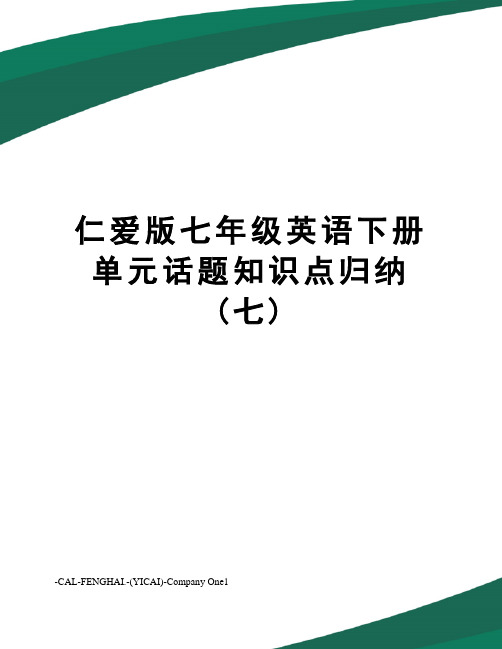
仁爱版七年级英语下册单元话题知识点归纳(七)-CAL-FENGHAI.-(YICAI)-Company One1Unit 7 Topic 1一、重点词汇和短语二、语言点Section A1.When was she born,…他什么时候出生的,……当表达某人出生于某时或某地时,用一般过去时was/ were born。
如:Where were you born 你在哪儿出生的2. she was born in July, 1965 .她出生于1965年7月。
在具体的某日前,用介词on;在月份或年份前用介词in。
如:on April 1st, 2005 在2005年4月1日 in June, 1970 在1970年6月 in 2004 在2004年3.年份的读法:Section B1.When is your birthday, Kangkang 本句中的when是特殊疑问句,表示“什么时候”,有时相当于what time.但是when的适用范围较广,可以对年月日,几时几分等进行提问;而what time常对具体的几点几分进行提问。
When do you want to go to Beijing你想什么时候去北京 What time do you usually go to bed你通常什么时候(指几点钟)睡觉2. —What’s the date today? 今天是几号—It’s May 8th. 5月8日。
What’s the date today?是询问日期的句型3. How do you plan to celebrate it你打算怎样庆祝plan to do sth.打算做某事4.My friends want to have birthday party for me.have a birthday party举办生日聚会5.基数词变序数词的规律1, 2, 3 要牢记, 结尾各是t,d,d;8去t,9去e; ve要用f 替;然后再加th;整十变化需注意, ty变成tie, 后面再加th;假如遇到“几十几”,只变个位就可以Section C1. …what’s the shape of your present 你的礼物是什么形状对物体的形状提问常用句型“What’s the shape of…”What’s the shape of`····= What shape is ·····2.—What color is it它是什么颜色—It’s black and white.是黑白相间的对物体的颜色提问常用句型:What color ·····3. Oh! I get it. I get it. 我猜到了。
仁爱版英语七年级下册各单元知识点归纳
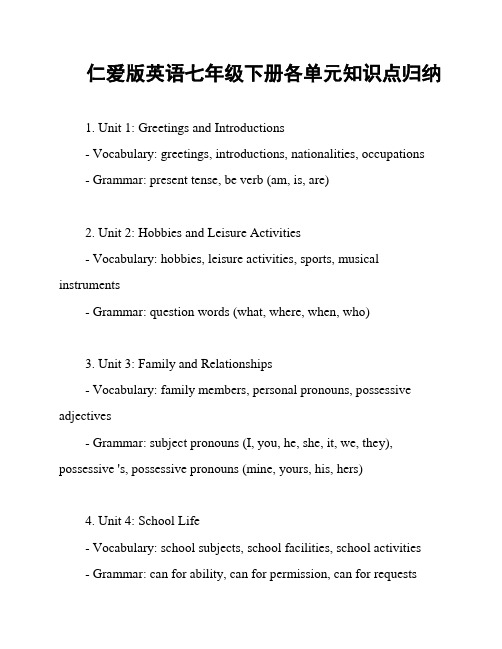
仁爱版英语七年级下册各单元知识点归纳1. Unit 1: Greetings and Introductions- Vocabulary: greetings, introductions, nationalities, occupations- Grammar: present tense, be verb (am, is, are)2. Unit 2: Hobbies and Leisure Activities- Vocabulary: hobbies, leisure activities, sports, musical instruments- Grammar: question words (what, where, when, who)3. Unit 3: Family and Relationships- Vocabulary: family members, personal pronouns, possessive adjectives- Grammar: subject pronouns (I, you, he, she, it, we, they), possessive 's, possessive pronouns (mine, yours, his, hers)4. Unit 4: School Life- Vocabulary: school subjects, school facilities, school activities- Grammar: can for ability, can for permission, can for requests5. Unit 5: Daily Routines- Vocabulary: daily activities, time expressions, adverbs of frequency- Grammar: simple present tense, adverbs of frequency (always, often, sometimes, never)6. Unit 6: Food and Drinks- Vocabulary: food items, drinks, restaurant vocabulary- Grammar: countable and uncountable nouns, quantifiers (some, any)7. Unit 7: Places and Directions- Vocabulary: places in town, prepositions of location, directions- Grammar: imperatives, there is/there are8. Unit 8: Transportation- Vocabulary: means of transportation, travel vocabulary- Grammar: past tense (regular and irregular verbs), past tense of be verb (was, were)以上是仁爱版英语七年级下册各单元的知识点归纳。
2020仁爱版初中英语七年级下册知识点、重点句型、单词归纳
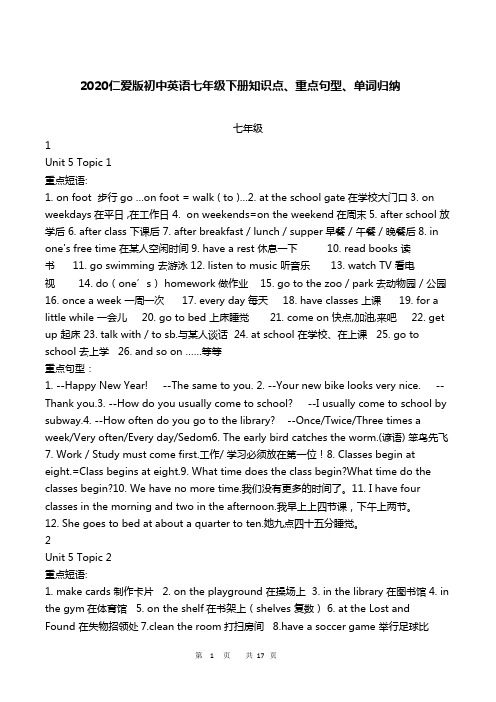
2020仁爱版初中英语七年级下册知识点、重点句型、单词归纳七年级1Unit 5 Topic 1重点短语:1. on foot 步行go …on foot = walk ( to )…2. at the school gate在学校大门口3. on weekdays在平日 ,在工作日4. on weekends=on the weekend在周末5. after school 放学后6. after class 下课后7. after breakfast / lunch / supper早餐 / 午餐 / 晚餐后8. in one's free time在某人空闲时间9. have a rest 休息一下 10. read books 读书 11. go swimming 去游泳 12. listen to music 听音乐 13. watch TV 看电视 14. do(one’s) homework 做作业 15. go to the zoo / park去动物园 / 公园16. once a week 一周一次 17. every day 每天 18. have classes 上课 19. for a little while 一会儿 20. go to bed 上床睡觉 21. come on 快点,加油,来吧 22. get up 起床 23. talk with / to sb.与某人谈话 24. at school 在学校、在上课 25. go to school 去上学 26. and so on ……等等重点句型:1. --Happy New Year! --The same to you.2. --Your new bike looks very nice. --Thank you.3. --How do you usually come to school? --I usually come to school by subway.4. --How often do you go to the library? --Once/Twice/Three times a week/Very often/Every day/Sedom6. The early bird catches the worm.(谚语) 笨鸟先飞7. Work / Study must come first.工作/ 学习必须放在第一位!8. Classes begin at eight.=Class begins at eight.9. What time does the class begin?What time do the classes begin?10. We have no more time.我们没有更多的时间了。
最全最全最新(仁爱版)英语七年级下册各单元基础知识点归纳完整版
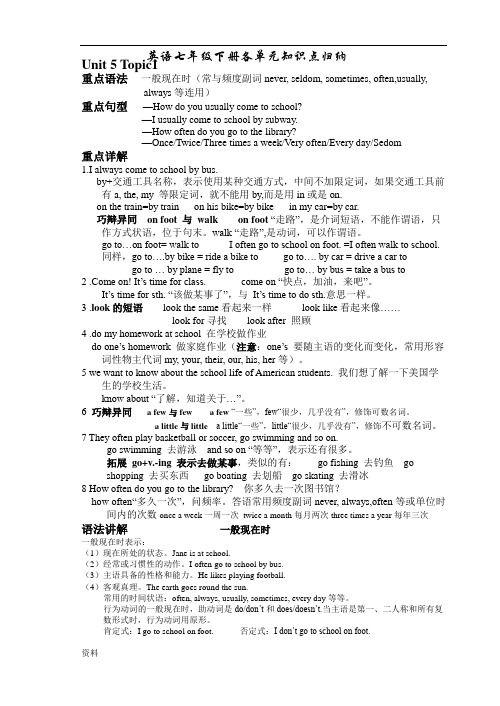
英语七年级下册各单元知识点归纳Unit 5 Topic1重点语法一般现在时(常与频度副词never, seldom, sometimes, often,usually, always等连用)重点句型—How do you usually come to school?—I usually come to school by subway.—How often do you go to the library?—Once/Twice/Three times a week/Very often/Every day/Sedom重点详解1.I always come to school by bus.by+交通工具名称,表示使用某种交通方式,中间不加限定词,如果交通工具前有a, the, my 等限定词,就不能用by,而是用in或是on.on the train=by train on his bike=by bike in my car=by car.巧辩异同on foot 与walk on foot “走路”,是介词短语,不能作谓语,只作方式状语,位于句末。
walk “走路”,是动词,可以作谓语。
go to…on foot= walk to I often go to school on foot. =I often walk to school.同样,go to….by bike = ride a bike to go to…. by car = drive a car to go to … by plane = fly to go to… by bus = take a bus to2 .Come on! It’s time for class. come on “快点,加油,来吧”。
It’s time for sth. “该做某事了”,与It’s time to do sth.意思一样。
3 .look的短语look the same看起来一样look like看起来像……look for寻找look after 照顾4 .do my homework at school 在学校做作业do one’s homework 做家庭作业(注意:one’s 要随主语的变化而变化,常用形容词性物主代词my, your, their, our, his, her等)。
七年级下册(2020年仁爱版)各单元重点知识点汇总

七年级下册(2020年仁爱版)各单元重点知识点汇总!Unit 5 Topic 1重点短语:1. on foot 步行go …on foot = walk ( to )…2. at the school gate 在学校大门口3. on weekdays 在平日,在工作日4. on weekends=on the weekend 在周末5. after school 放学后6. after class 下课后7. after breakfast / lunch / supper 早餐/ 午餐 / 晚餐后8. in one's free time在某人空闲时间9. have a rest 休息一下10. read books 读书11. go swimming 去游泳12. listen to music 听音乐13. watch TV 看电视14. do(one’s) homework 做作业15. go to the zoo / park 去动物园/ 公园16. once a week 一周一次17. every day 每天18. have classes 上课19. for a little while 一会儿20. go to bed 上床睡觉21. come on 快点,加油,来吧22. get up 起床23. talk with / to sb.与某人谈话24. at school 在学校、在上课25. go to school 去上学26. and so on ……等等重点句型:1. --Happy New Year!--The same to you.2. --Your new bike looks very nice.--Thank you.3. --How do you usually come to school?--I usually come to school by subway.4. --How often do you go to the library?--Once/Twice/Three times a week/Very often/Every day/Sedom6. The early bird catches the worm.(谚语) 笨鸟先飞7. Work / Study must come first.工作/ 学习必须放在第一位!8. Classes begin at eight.=Class begins at eight.9. What time does the class begin?What time do the classes begin?10. We have no more time.我们没有更多的时间了。
仁爱七年级下册重要知识点
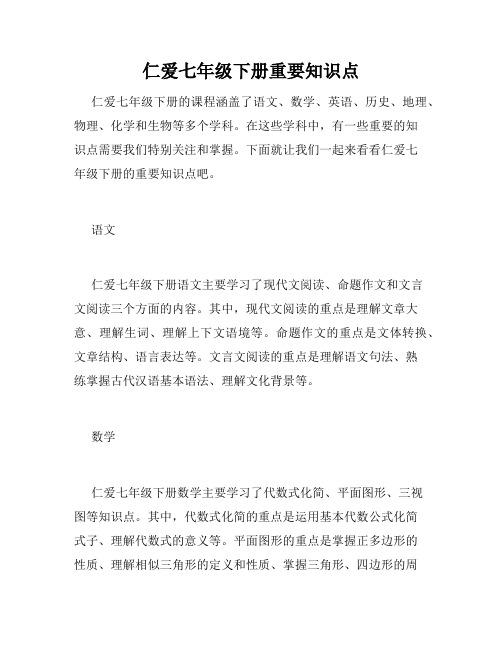
仁爱七年级下册重要知识点仁爱七年级下册的课程涵盖了语文、数学、英语、历史、地理、物理、化学和生物等多个学科。
在这些学科中,有一些重要的知识点需要我们特别关注和掌握。
下面就让我们一起来看看仁爱七年级下册的重要知识点吧。
语文仁爱七年级下册语文主要学习了现代文阅读、命题作文和文言文阅读三个方面的内容。
其中,现代文阅读的重点是理解文章大意、理解生词、理解上下文语境等。
命题作文的重点是文体转换、文章结构、语言表达等。
文言文阅读的重点是理解语文句法、熟练掌握古代汉语基本语法、理解文化背景等。
数学仁爱七年级下册数学主要学习了代数式化简、平面图形、三视图等知识点。
其中,代数式化简的重点是运用基本代数公式化简式子、理解代数式的意义等。
平面图形的重点是掌握正多边形的性质、理解相似三角形的定义和性质、掌握三角形、四边形的周长和面积公式等。
三视图的重点是绘制三视图、理解三视图的投影关系等。
英语仁爱七年级下册英语主要学习了听、说、读、写四个方面的内容,涵盖了基础语法、词汇、口语表达等多个方面。
其中,基础语法的重点是动词时态、形容词和副词等基本语法知识。
词汇的重点是掌握常用单词、语法单词、词组和短语等。
口语表达的重点是流利地表达基本情况、思维和感受,培养听力和口语表达能力等。
历史仁爱七年级下册历史主要学习了中华文化的发展、中国古代科技、世界古代文明等方面的内容。
其中,中华文化的发展的重点是理解周、秦、汉、唐等历史时期中华文化的发展和演变过程、融合外来文化等。
中国古代科技的重点是理解古代农业、手工业和商业等领域的科技发展、掌握古代科技的产生、发展与传播、理解科技对人类社会的发展与进步等。
世界古代文明的重点是理解古代巴比伦、古希腊、古罗马等文明的发展、掌握各个文明的主要特征、理解文明的交流互鉴、掌握世界文明的不同面貌等。
地理仁爱七年级下册地理主要学习了地球及其运动、自然环境及其变化、人口与城市等内容。
其中,地球及其运动的重点是理解地球的自转和公转、认识地球的不同自然环境和气候、掌握地球的结构和地理背景等。
- 1、下载文档前请自行甄别文档内容的完整性,平台不提供额外的编辑、内容补充、找答案等附加服务。
- 2、"仅部分预览"的文档,不可在线预览部分如存在完整性等问题,可反馈申请退款(可完整预览的文档不适用该条件!)。
- 3、如文档侵犯您的权益,请联系客服反馈,我们会尽快为您处理(人工客服工作时间:9:00-18:30)。
七年级下册(2020年仁爱版)各单元重点知识点汇总!Unit 5 Topic 1重点短语:1. on foot 步行go …on foot = walk ( to )…2. at the school gate 在学校大门口3. on weekdays 在平日,在工作日4. on weekends=on the weekend 在周末5. after school 放学后6. after class 下课后7. after breakfast / lunch / supper 早餐/ 午餐 / 晚餐后8. in one's free time在某人空闲时间9. have a rest 休息一下10. read books 读书11. go swimming 去游泳12. listen to music 听音乐13. watch TV 看电视14. do(one’s) homework 做作业15. go to the zoo / park 去动物园/ 公园16. once a week 一周一次17. every day 每天18. have classes 上课19. for a little while 一会儿20. go to bed 上床睡觉21. come on 快点,加油,来吧22. get up 起床23. talk with / to sb.与某人谈话24. at school 在学校、在上课25. go to school 去上学26. and so on ……等等重点句型:1. --Happy New Year!--The same to you.2. --Your new bike looks very nice.--Thank you.3. --How do you usually come to school?--I usually come to school by subway.4. --How often do you go to the library?--Once/Twice/Three times a week/Very often/Every day/Sedom6. The early bird catches the worm.(谚语) 笨鸟先飞7. Work / Study must come first.工作/ 学习必须放在第一位!8. Classes begin at eight.=Class begins at eight.9. What time does the class begin?What time do the classes begin?10. We have no more time.我们没有更多的时间了。
11. I have four classes in the morning and two in the afternoon.我早上上四节课,下午上两节。
12. She goes to bed at about a quarter to ten.她九点四十五分睡觉。
Topic 2Topic 3重点短语:1. outdoor activity 课外活动2. easy and interesting 容易又有趣3. difficult and boring 又难又乏味4. be friendly to sb. =be kind to sb. 对某人友好5. between…and…在……之间…6. learn(…)from…向…学习…/从…中学…7. learn about the past了解过去8. learn about了解9. learn by oneself自学10. from…to…从……到……11. in the morning / afternoon / evening 在早上/ 下午/ 晚上12.on Monday 在星期一13. on Monday morning在星期一的早上14. tell sb. about sth告诉某人关于某事重点句型:1. --What day is it today?--It’s Sunday. (在英语国家每周的第一天是星期天而不是星期一)2. --What class are they having?--They are having a music class.3. --What time does the class begin?--At ten o’clock.4. --What do you think of math? / How do you like math ?你认为数学怎么样?--It’s difficult and boring.5. --Why (为什么)do you like English ?--Because(因为)it’s easy and interesting.7. --What subject (学科)do you like best ?--I like history best.8. At school, my teachers and classmates are very friendly to me.9. I study Chinese, English, politics, geography and some other subjects.(other泛指其他的,别的+ 名词复数. another 泛指又一个、再一个、另一个+名词单数.the other 两者中的另一个)10. English is my favorite subject.11. I also like P.E and music.I like P.E and music , too. (也)12. Can you tell me something about it?Unit 6Topic 1重点词组:1. Why not… =Why don’t you…2. go upstairs上楼3. go downstairs下楼4. A moment later一会以后5. study n.书房 v.学习6. in the front of the house 在屋子(里面的)前面7. in front of the house 在屋子(外面的)前面8. talk about+n/v-ing谈论,议论,讨论某事9. talk with sb. 与某人交谈10. put them away 把他们收拾好11. Look after = take care of照顾12. play with sb. “与某人一起玩”13. in the tree(外物附着)在树上14. on the tree 树本身长出来的花,树叶等15. on the wall在墙上16. in the wall 在墙里17. on the river浮在水面上18. over the river 在河上(悬空)19. tell sb about sth告诉某人关于某事20. tell sb to do sth 让某人做某事21. tell sb sth告诉某人某事22. want to do sth.想要做某事重点句型:1. There are two bedrooms and a small study. 有两张床和一个小的书房。
2. There is a lamp, a computer, some books and so> 有一个台灯,一个电脑,一些书等等。
3.—Is there a computer in your study? 在你的书房有一台电脑吗?—Yes, there is. 是的,有。
4. Don't put them here. Put them away. 不要把他们放这儿,把他们收拾起来5. There are many beautiful flowers in the garden, but there aren’t any trees in it. 花园里有许多漂亮的花,但是却没有树。
Topic 2重点短语:1. live with sb. 和某人居住在一起2. in the country 在农村3. look for 寻找4. for rent 出租5.excuse me 打扰了,打扰一下,劳驾,请原谅6.on the street corner 在街道拐角处7. train stationn 火车站8. park cars 停车9. keep money 存钱10. right now 立刻,马上11. from... to... 从……到……12. take trains 乘火车13. see a doctor 看医生14. mail letter 邮寄信15. at the end of ...在……的尽头16. on the right 在右边17. lot of = lots of 许多18. close to 距离……近,紧挨着的19. far from距离……远20. kitchen fan 厨房排气扇21. get sb. to do sth.派人去做某事22. a ticket for speeding 超速罚单23. go across穿过24. turn left/right向左转/向右转25. on the corner of 在…转角/拐弯处26. across from 在…对面27. between……and 在…之间28. take the No. 718 bus 乘坐718路公共汽车重点句型:1.--What’s your home like?你的家是什么样的?--It’s an apartment building.它是一栋公寓楼。
2. They live in a big farmhouse in the country.他们住在农村的农舍里。
3. What’s the matter?怎么了?4. I can’t hear you, the line is bad.我听不清,线路不好。
5. I’ll get someone to check it right now.我马上派人去检查。
6. There is something wrong with my kitchen fan.我厨房的风扇出了点问题。
7. There are many houses with big yards in the suburbs.郊区有许多带着大院子的房子。
8. What kind of home do you live in?你住在什么样的房子里?9. --I ‘m afraid it’s too loud.恐怕声音有点大--I’ m really sorry about that.我真的对此很抱歉.Topic 3重点短语:1. change to变成2. no parking禁止停车3. get/be hurt受伤4. obey the traffic rules 遵守交通规则5. keep on the right of the road 保持在路的右边6. at the foot of 在…的脚下7. hold sth in one’s hand抓住某人的手8. make sb./sth. +v. 使某人或某物做某事9. t’s good to do sth. 做某事是好的重点句型:1.问路①Where is the bookstore?②Is there a bookstore near here?③Excuse me, is there a bank near here? 打扰了,请问附近有银行吗?④Which is the way to the bookstore?⑤How can I get to the bookstore?⑥Could you tell me the way to the bookstore?= Could you tell me how I can get to the bookstore?= Could you tell me how to get to the bookstore?= Could you tell me Where the bookstore is?2.指路:①Go along/down this road until……Go up (Go along)this street to the end ,and you will find it on your left.沿着这条街一直走到尽头,你就会发下银行在你左边。
